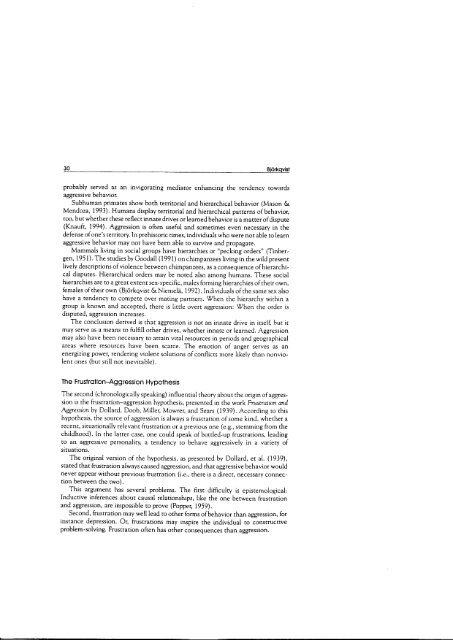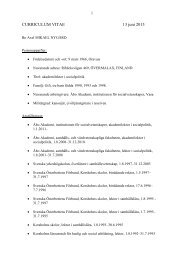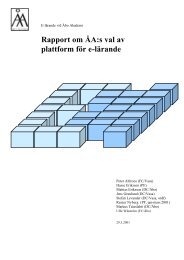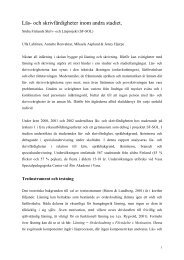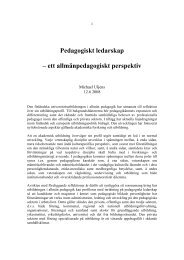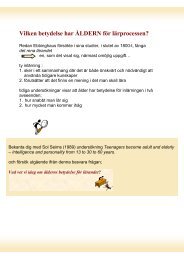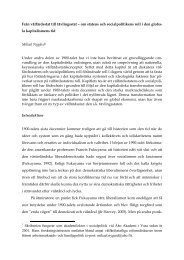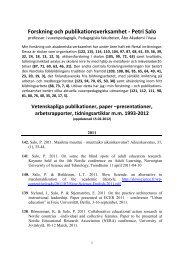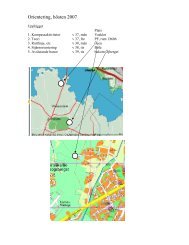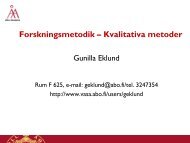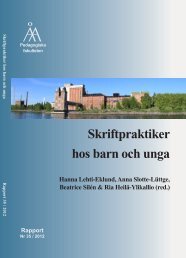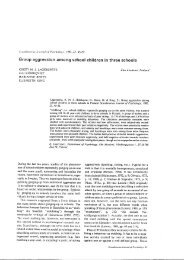Theoretical Considerations on Conflict and Aggression
Theoretical Considerations on Conflict and Aggression
Theoretical Considerations on Conflict and Aggression
You also want an ePaper? Increase the reach of your titles
YUMPU automatically turns print PDFs into web optimized ePapers that Google loves.
30 Biorkqvislprobably served as an invigoraring mediaror enhancing the tendency towardsaggressive behavior.Subhuman primates show borh terrirorial <strong>and</strong> hierarchical behavior (Mas<strong>on</strong>&Mendoza, 1993). Humans display territorial <strong>and</strong> hierarchical parrerns of behavror,too, but whether chese reflect innate drives or learned behavior is a matter ofdispute(Knauft, 1994). Aggressi<strong>on</strong> is often useful <strong>and</strong> somerimes even necessary in thedefense of <strong>on</strong>e's territory. In prehistoric times, individuals who were noc able to learnaggressive behavior may nor have been able to survive <strong>and</strong> propagare.Mammals living in social groups have hierarchies or "pecking orders" (Tinbergen,1951). The studies by Goodatl ( 1991) <strong>on</strong> chimpanzees living in rhe wild presentlively descripti<strong>on</strong>s ofviolence berween chimpanzees, as a c<strong>on</strong>sequence ofhierarchicaldisputes. Hierarchical orders may be noced also am<strong>on</strong>g humans. These socialhierarchies are to a grear extenr sex-specific, males forming hierarchies of their own,females of their own (Bjorkqvisr &Niemelii, 1992). Individuals of rhe same sex alsohave a tendency to compete over mating partners. When rhe hierarchy wirhin agroup is known <strong>and</strong> accepted, there is litrle overt aggressi<strong>on</strong>: When the order isdisputed, aggressi<strong>on</strong> increases.The c<strong>on</strong>clusi<strong>on</strong> derived is that aggressi<strong>on</strong> is nor an innare drive in itsel{, bur rrmay serve as a means to fulfill ocher drives, wherher innare or learned. Aggressr<strong>on</strong>may also have been necessary ro arrain viral resources in periods <strong>and</strong> geographicalareas where resources have been scarce. The emori<strong>on</strong> of anger serves as anenergizing power, rendering violent soluti<strong>on</strong>s of c<strong>on</strong>flicts more likely than n<strong>on</strong>violenc<strong>on</strong>es (but sdll not inevirable).The Frustroti<strong>on</strong>-Aggressi<strong>on</strong> HypothesisThe sec<strong>on</strong>d (chr<strong>on</strong>ologically speaking) influer.rtiaI theory abour the origin of aggressi<strong>on</strong>is the frustrati<strong>on</strong>-aggressi<strong>on</strong> hypothesis, presented in rhe work Ftustrati<strong>on</strong> <strong>and</strong>Aggressi<strong>on</strong> by Dollard, Doob, Miller, Mowrer, <strong>and</strong> Sears (1939). According to rhishypothesis, the source ofaggressi<strong>on</strong> is always a frustrati<strong>on</strong> ofsome kind, whether arecent, situati<strong>on</strong>ally relevant frusrrati<strong>on</strong> or a previous <strong>on</strong>e (e.g., stemming from thechildhood). In rhe latter case, <strong>on</strong>e could speak ofbottled-up frustrari<strong>on</strong>s, leadrngto an aggressive pers<strong>on</strong>aliry a tendency to behave aggressively in a variery ofsituati<strong>on</strong>s.The original versi<strong>on</strong> of the hyporhesis, as presenred by Dollard, et al. (1939),stated that frustrati<strong>on</strong> always caused aggressi<strong>on</strong>, <strong>and</strong> thar aggressive behavior wouldnever appear withour previous frustrati<strong>on</strong> (i.e., there is a direct, necessary c<strong>on</strong>necti<strong>on</strong>between che rwo).This argument has several problems. The firsr difficulry is epistenrological:Inductive inferences about causal relati<strong>on</strong>ships, like the <strong>on</strong>e between frusrati<strong>on</strong><strong>and</strong> aggressi<strong>on</strong>, are impossible ro prove (Poppea 1959).Sec<strong>on</strong>d, frustrati<strong>on</strong> may well lead to other forms of behavior than aggressi<strong>on</strong>, forinstance depressi<strong>on</strong>. Or, frustrad<strong>on</strong>s may inspire the individual ro c<strong>on</strong>srrucnveproblem-solving. Frustrati<strong>on</strong> often has other c<strong>on</strong>sequences than aggressi<strong>on</strong>.


